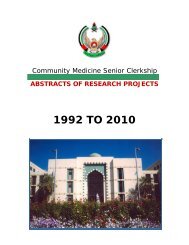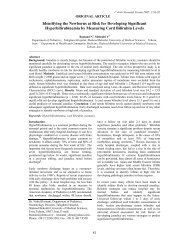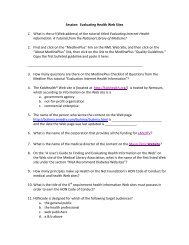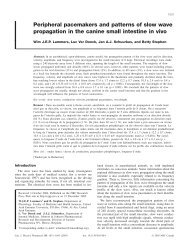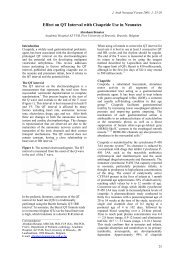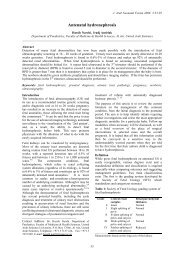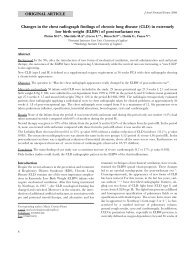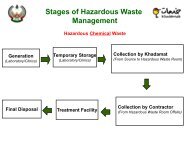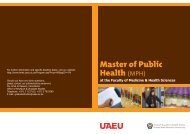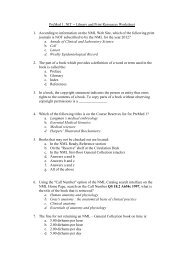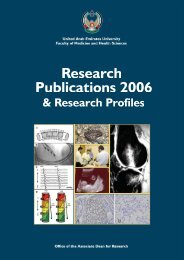Research Profile - College of Medicine and Health Science - United ...
Research Profile - College of Medicine and Health Science - United ...
Research Profile - College of Medicine and Health Science - United ...
You also want an ePaper? Increase the reach of your titles
YUMPU automatically turns print PDFs into web optimized ePapers that Google loves.
Department <strong>of</strong> Pharmacology<br />
IGF receptors. Drugs targeting receptor tyrosine<br />
kinases (ErbB2/HER2 <strong>and</strong> ABL/c-kit) impact the<br />
PI3K/Akt pathway. Consequently, the inhibition<br />
<strong>of</strong> Akt is considered to be an attractive cancer<br />
therapeutic target. Three is<strong>of</strong>orms <strong>of</strong> Akt<br />
(Akt1/PKB·, Akt2/PKB‚, <strong>and</strong> Akt3/PKBÁ) are overexpressed<br />
<strong>and</strong> activated in cancers, but the<br />
degree <strong>of</strong> functional redundancy between them<br />
on cancer cell survival <strong>and</strong> invasion are unclear.<br />
The identification <strong>of</strong> the Akt is<strong>of</strong>orm that is the<br />
most promising target for cancer therapy is<br />
unknown <strong>and</strong> will be addressed in the following<br />
specific objectives:<br />
a. To explore the respective roles <strong>of</strong> Akt-1, -2<br />
<strong>and</strong> -3 in cancer cell survival, invasion, tumor<br />
growth <strong>and</strong> metastasis, studies will be<br />
conducted using RNA interference technology<br />
in LNM35 human lung cancer cells <strong>and</strong> HT29<br />
human colon cancer cells.<br />
b. To characterize the ability <strong>of</strong> different is<strong>of</strong>orms<br />
<strong>of</strong> Akt (Akt-1, -2 <strong>and</strong> -3) to transactivate different<br />
subsets <strong>of</strong> target genes to orchestrate either<br />
cell survival or invasion. This will be investigated<br />
in colon <strong>and</strong> lung cancer cells using microarray<br />
analysis.<br />
using microarray analysis <strong>and</strong> confirm the results<br />
by real-time RT-PCR. It is anticipated that this<br />
project will provide evidence that targeting<br />
Akt-1 <strong>and</strong>/or -2 is a promising strategy for the<br />
treatment <strong>of</strong> colon <strong>and</strong> lung cancer.<br />
2. Screening <strong>of</strong> potential anti-cancer<br />
compounds using in vitro <strong>and</strong> in vivo assays<br />
The overall goals <strong>of</strong> this part <strong>of</strong> my research are<br />
directed towards studying the in vitro <strong>and</strong> in vivo<br />
cytotoxic properties <strong>of</strong> the synthesized/purified<br />
drugs (Luteolin, Thymoquinone <strong>and</strong> Frondoside<br />
A). The effective drugs will be further<br />
investigated in order to determine their<br />
mechanisms <strong>of</strong> action using various molecular<br />
biological techniques. In addition, we will<br />
attempt to investigate the effects <strong>of</strong> these drugs<br />
on cell survival <strong>and</strong> invasion in vitro <strong>and</strong> on<br />
tumor growth in vivo. The effects on metastasis<br />
in nude mice using various cancer cell lines will<br />
also be investigated.<br />
The effects <strong>of</strong> knockdown <strong>of</strong> Akt-1, -2 or -3 on<br />
cellular survival will be determined by cellular<br />
viability, DNA fragmentation, cell cycle <strong>and</strong><br />
TUNEL assays, caspases activity, PARP cleavage,<br />
cytochrome-c release <strong>and</strong> expression <strong>of</strong> pro<strong>and</strong><br />
anti- apoptotic proteins. The impact <strong>of</strong> Akt-<br />
1, -2 or -3 silencing on invasion will be<br />
investigated using the collagen type I <strong>and</strong> the<br />
chick heart invasion assays, cell-cell <strong>and</strong> cellmatrix<br />
adhesion <strong>and</strong> expression <strong>of</strong> E-Cadherin.<br />
The effect <strong>of</strong> knock down <strong>of</strong> the Akt’s on HT29<br />
cell line on tumour growth will be tested in<br />
nude mice. In addition, we will assess the<br />
development <strong>of</strong> new blood vessels (CD31<br />
antibody), the presence <strong>of</strong> apoptotic cells<br />
(caspase 3 activity), <strong>and</strong> proliferative activity<br />
(ki67 antibody). We’ll test the therapeutic impact<br />
<strong>of</strong> the Akt is<strong>of</strong>orms inhibition on metastasis<br />
using the highly invasive <strong>and</strong> metastatic lung<br />
cancer cell line LNM35 targeting the lymph<br />
nodes <strong>and</strong> lungs. This cell line is stably<br />
transfected with a vector encoding luciferase,<br />
to allow a rapid <strong>and</strong> reliable quantification <strong>of</strong><br />
micro-metastases. To identify the mechanisms<br />
underlying the effects <strong>of</strong> Akt is<strong>of</strong>orm inhibition,<br />
we will search for differentially expressed genes<br />
65



